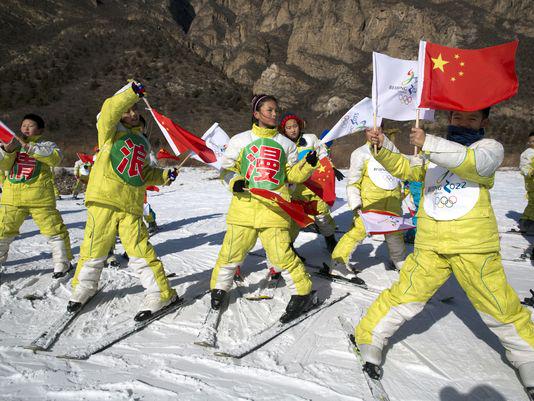
He Qiang is a sport lover in a country with little tradition of winter sports and is now seeking to host the 2022 Winter Olympics. He left his office job in the Chinese capital, living in mountains near the Great Wall where Beijing hope to stage skiing and other events in its bid to become the first city to hold both winter and summer Olympics.
Victory for Beijing would mean the end of concerns over region's general lack of natural snow and its air pollution. Beijing now appears to be the front-runner through well prepared bid effort. Almaty, Kazakhstan are the only remaining competitors after cities in Switzerland, Germany, Sweden, Norway and other countries dropped out.
"I believe the International Olympic Committee is looking for a safe, reliable and risk-free city. I think this city of Beijing meets those conditions," said Zhang Jiandong, Beijing's vice mayor and vice president of the bid committee. Beijing's success in the 2008 Summer Olympics, strong government and public support and its stadiums make it best, Zhang said.
Olympic officials will visit in March to survey the city's athletes' village and media center. Beijing says its bid closely meets the International Olympic Council's 2020 goals. In all, the city plans to spend $3.9 billion on buildings and operations. The IOC will announce the winner at its July meeting in Kuala Lumpur, Malaysia.
By 2022, Beijing plans to reduce its annual coal consumption from 19 million to just 5 million tons, while stricter standards have already reduced automobile emissions by almost a quarter, despite the addition of 2.6 million cars since the 2008 games.
Already a top medal earner in the game, China won its first Winter Olympic medals in 1992, and has racked up a total of 12 golds in skating and freestyle skiing. It's now setting its sights on ice hockey, with Beijing counting 1,500 players in its 97 youth teams. A major concern for Beijing's bid is the lack of natural snow in the mountains outside Beijing, which receives a meter or less per season. They use an estimated 1 million tons of water per year to make snow, and games organizers say rivers and reservoirs will provide adequate supplies.
本时文内容由奇速英语国际教育研究院原创编写,禁止复制和任何商业用途,版权所有,侵权必究!
1.Why did the writer mention He Qiang at the beginning?
A To show many young people leave their jobs easily.
B To introduce Beijing’s aim to bid Winter Olympics.
C To get readers to become interested in winter sports.
D To tell the mountains near the Great Wall is beautiful.
解析:选B。B。写作意图题。从文章第一段第二句的hope to stage skiing and other events in its bid to become the first city可知,作者写何强的事是为了导入北京申办冬奥会这一主题的。
2.What may cause Beijing to lose the bid?
A Large population.
B Much snow.
C Heavy pollution.
D Strong public support.
解析:选C。C。细节理解题。根据第二段第一句的Victory for Beijing would mean the end of concerns over region's general lack of natural snow and its air pollution可知少雪以及空气污染可能导致北京失去赢得申办的机会。
3.How many cities will Olympic officials survey next?
A Two.
B Three.
C Four.
D Eight.
解析:选B。B。细节理解题。根据第二段第三句的Almaty, Kazakhstan are the only remaining competitors可知这两个城市是北京申办冬奥会的唯一竞争者,因此奥运官员还要视察三个城市。
4.What is the main idea of paragraph five?
A The way to collect money.
B The cars to pay for.
C The money to spend.
D The goal to stop pollution.
解析:选D。D。主旨大意题。根据第五段第一句的By 2022, Beijing plans to reduce its annual coal consumption from 19 million to just 5 million tons可知该段讲述了北京要降低污染的目标。
5.How will Beijing solve the problem of less snow?
A They spend $3.9 billion in buying the snow.
B They will borrow some form Kuala Lumpur.
C They will build more rivers and reservoirs.
D They will produce snow out of the water.
解析:选D。D。推理判断题。从文章最后一段第四句的They use an estimated 1 million tons of water per year to make snow可知北京缺少降雪,但是他们会考虑用水来造雪。